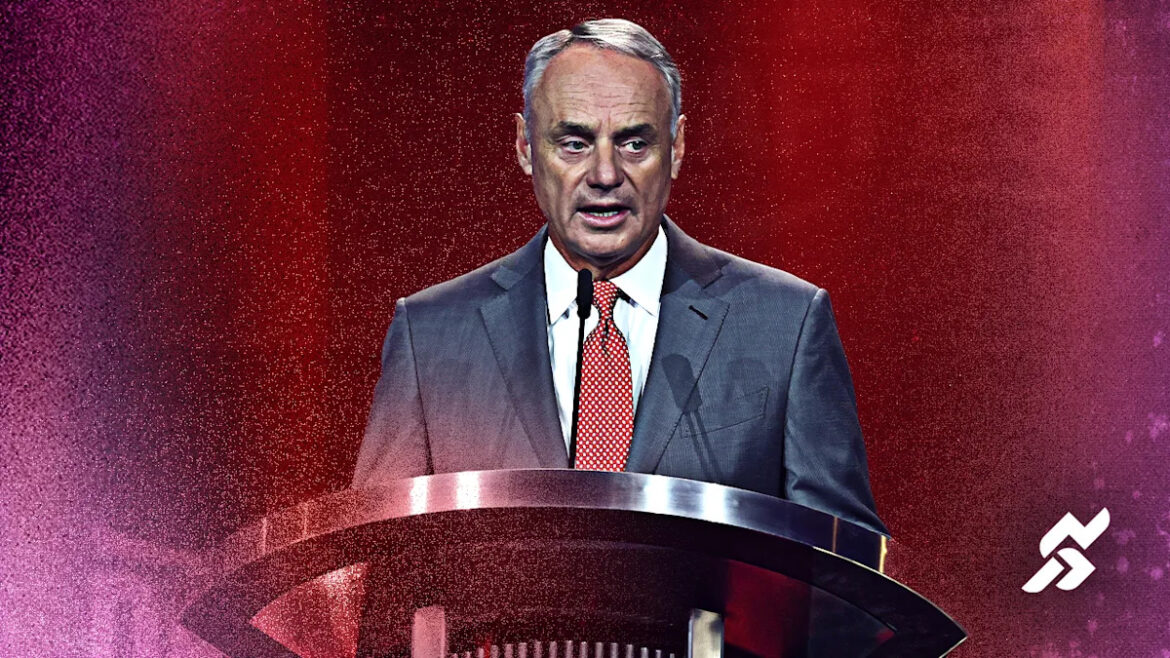On the heels of its most-watched postseason since 2017, Major League Baseball has officially signed off on a package of new, short-term media rights deals with NBCUniversal, ESPN and Netflix.
MLB commissioner Rob Manfred formally heralded the three-year agreements on Wednesday afternoon, or a little more than two months after he first acknowledged that negotiations over the league’s media arrangements for 2026-28 were effectively in the bottom of the ninth inning.
Advertisement
More from Sportico.com
Under the terms of the new package, MLB will return to the NBC airwaves on Opening Day of the 2026 season, as the Dodgers host the Diamondbacks. But for a pair of promotional one-offs that aired in 2022 and 2023, the March 26 NL West opener will mark NBC’s first significant MLB outing since Bob Costas signed off at the end of Game 6 of the 2000 American League Championship Series.
As part of a pact valued at nearly $200 million per year, NBC has assumed the rights to the ESPN mainstay Sunday Night Baseball and the four Wild Card series. As was the case during the program’s 36-year run on cable, the Sunday night matchup will continue to enjoy timeslot exclusivity, as no other MLB games will be scheduled opposite the weekly primetime showcase. Peacock and the revived NBCSN will pick up the slack on certain fall and spring dates when a scheduled SNB game conflicts with one of NBC’s NFL or NBA broadcast windows.
Peacock also regained the rights to MLB’s 18-game Sunday morning streaming package, which it helped inaugurate in 2022. After two seasons, the league shifted the carveout to Roku for the low, low price of $10 million per year, a discount that ESPN execs found particularly irksome, given Bristol’s own annual $550 million rights payment. (MLB’s Roku pact was one of the factors that led ESPN in February to announce its intention to terminate its legacy MLB contract three years before its 2028 expiration date.)
Advertisement
The NBC flagship first began airing MLB games in 1947, when Jackie Robinson made his debut with Brooklyn. On Oct. 27, 1999, the network served up 25.8 million viewers with its final World Series broadcast, as the Yankees completed their sweep of the Braves with a 4-1 win at home. It chalked up its all-time biggest MLB turnout with Game 7 of the 1986 World Series, as a crowd of nearly 60 million viewers watched the Mets rally from a 3-0 deficit to topple the Red Sox 8-5 at Shea.
The resumption of NBC’s long-dormant baseball duties began taking shape while MLB and ESPN were mending their fences. At times, the rift seemed unbreachable, especially after Manfred sent owners a memo in which he put the cable model on blast. “[We] do not believe that pay-TV, ESPN’s primary distribution platform, is the future of video distribution or the best platform for our content,” Manfred wrote, an assessment that couldn’t have been met with much enthusiasm by fellow MLB cable partners FS1 and TBS.
While the air had grown frosty in recent years, Manfred and ESPN chairman Jimmy Pitaro this summer began the process of what amounted to a mutual thawing-out. By September, it had become clear that neither party was ready to quit on its partner of four decades, and Pitaro’s team had worked out the broad strokes of a deal that would see ESPN assume oversight of the league’s out-of-market platform, MLB.TV.
In addition to snapping up the rights to sell and distribute MLB.TV, ESPN also has assumed the in-market rights to a six pack of RSN refugees that includes the Arizona Diamondbacks, Cleveland Guardians, Colorado Rockies, Minnesota Twins, San Diego Padres and Seattle Mariners. ESPN has the option to pick up additional local rights if and when they become available.
Advertisement
Although local baseball is now the focal point of ESPN’s MLB investment, Bristol will continue to carry a 30-game slate of nationally televised games across its linear networks and the ESPN app. Among the games ESPN will host next season include a Phillies-Mets clash on July 16 and Braves-Brewers in next year’s Little League Classic. ESPN closed out its final season of Sunday Night Baseball with its strongest deliveries in 12 years, as the package averaged 1.8 million viewers per game—up 21% versus 2024.
While terms were not disclosed, ESPN is said to have agreed to continue paying the annual $550 million rights fee stipulated in its original contract.
For its part, Netflix has picked up the rights to a pair of midseason tentpoles in the Home Run Derby and the “Field of Dreams” game. The streaming giant also will carry the standalone Opening Day meeting between the Yankees and Giants.
Although Netflix stopped reporting its subscriber numbers at the start of 2025, the last official head count put its global base at 301.6 million customers. In exchange for its new baseball package, Netflix will pay MLB approximately $35 million per year.
Advertisement
The Netflix deal comes as the company begins prepping for its second annual NFL Christmas doubleheader. In its inaugural holiday offering, Netflix last year averaged 24.2 million U.S. viewers with a Chiefs-Steelers/Ravens-Texans two-fer, the latter of which included a halftime performance by Beyoncé.
In finally wrapping up its new suite of rights deals after a full season of negotiations, MLB can now focus its attention on the rapidly approaching 2028 campaign, when all of its national contracts are set to expire. While lead TV partner Fox Sports is determined to continue its longstanding partnership with baseball, the ontological status of another linear player is somewhat more uncertain as Paramount, Comcast and Netflix prepare their bids on TNT Sports’ parent company, Warner Bros. Discovery.
Manfred has said he hopes to increase the number of national MLB games under the next round of rights deals, while developing a centralized model for all local rights.
Best of Sportico.com
Advertisement
Sign up for Sportico’s Newsletter. For the latest news, follow us on Facebook, Twitter, and Instagram.
